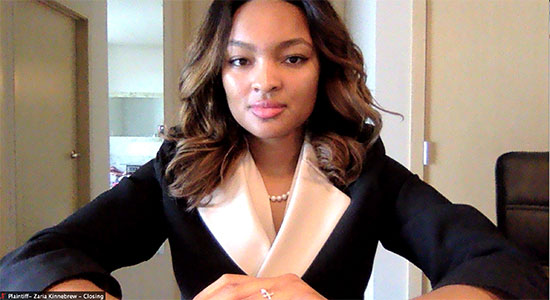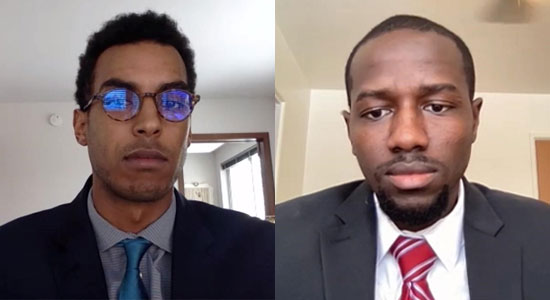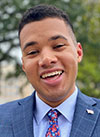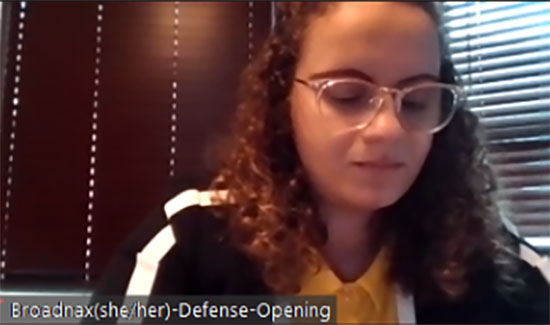
1L Zaria Kinnebrew listens to her opponent’s closing argument.
On a February morning, Martha Broadnax took a deep breath and began her opening statement. Martha was representing a big tech corporation, A.I. Motors Inc., that had been accused of negligently failing to warn consumers about the limitations of one of its purportedly self-driving vehicles and thus contributing to a vehicle crash.
This was Martha’s first failure-to-warn case, her first time in the role of defense counsel, and her first opening statement. She collected her thoughts and began, “Good morning, your honor, members of the jury, and may it please the court.” At the same time, across cyberspace, in a different breakout room of the same videoconference call, Raine Black was also starting her opening statement.
State Bar Resources Help Law Students Succeed … Even Before Beginning to Practice
The State Bar offers a variety of resources to law students who join the free law student associate program. Take advantage of the statewide network and learning opportunities before you begin practicing law.
Jump to the sidebar below to learn more
Raine, like Martha, was defending A.I. from the claim that it had failed to warn consumers. But she was doing so very differently. Raine focused on the warnings that A.I. had provided to its customers.
“Warnings are not meant to be ignored,” she explained in a calm, matter-of-fact way. Martha, on the other hand, focused on the precautions A.I. had taken to keep its customers safe in support of her argument that the negligence of the other involved parties had caused the crash.
These were two very different themes and two very different strategies based on the same set of facts and leading to the same result. At the end of the trial, Martha’s co-counsel, Russel Cunningham, and Raine’s co-counsel, Alexis Leonard, both asked the jury to find A.I. not liable. As Martha, Russel, Raine, and Alexis tried their cases, Damon Terrell was collecting his thoughts as he prepared to address the U.S. Supreme Court.
Later that same morning, in another trial in a different case, Damon argued on behalf of the respondent to a petition that sought to overturn a ruling that expanded transgender inmates’ rights under the Eighth Amendment to the U.S. Constitution. To make things more complicated, before the Eighth Amendment issue could be heard, Damon first had to convince the justices that one respondent’s amended complaint could survive an undifferentiated Rule 12 motion. That respondent was a prisoner when she filed her original complaint, which was found deficient under the Prison Litigation Reform Act (PLRA). But she was granted leave to amend and filed an amended complaint after being released from prison. Did her release from prison remove her complaint from the ambit (one of Damon’s favorite words) of the PLRA? As Damon explained that morning, absolutely.
While they argued their cases, Martha, Raine, Damon, and their teammates were making history.
Well-trained, diverse advocates play a crucial role in keeping the legal profession, and society as a whole, moving forward. Diversity-forward advocacy programs such as those supported and engaged in by the U.W. Law School’s Black Law Students Association (BLSA) contribute significantly to this goal. The 2020-21 academic year was historic for the BLSA.

3L Randall Ollie (left) and 2L Mamadou Jawo, were plaintiff’s counsel for the 2L and 3L team.
Bringing Change within the Legal Community
The BLSA has consistently been a presence at the Constance Baker Motley Mock Trial Competition. But this year, possibly for the first time, the BLSA sent two teams (one made up entirely of 1L students). Similarly, although the chapter has sent teams to the Thurgood Marshall Moot Court Competition in the past, this might have been the first time that the association sent a 1L team. For these reasons, the 2020-21 competition year likely was the biggest yet for the BLSA. That matters.
 Mason Higgins will be 3L at the U.W. Law School in 2021-22. During the 2020-21 school year, he served as head coach of the mock trial teams of the U.W. Law School’s Black Law Students Association. He also represented BLSA on its moot court team. In 2021-22, Higgins will serve as the program’s president and BLSA’s director of academic excellence.
Mason Higgins will be 3L at the U.W. Law School in 2021-22. During the 2020-21 school year, he served as head coach of the mock trial teams of the U.W. Law School’s Black Law Students Association. He also represented BLSA on its moot court team. In 2021-22, Higgins will serve as the program’s president and BLSA’s director of academic excellence.
He is working as a summer associate with the commercial litigation team at Michael Best & Friedrich, Madison. To support BLSA’s mock trial and moot court programs, contact the author. Get to know the author: Check out Q&A below.
It does not take clairvoyance to predict that 2020 will be remembered for three things: the novel and devastating coronavirus, the unprecedented refusal by Donald Trump to accept the election victory of President Joe Biden, and the surge in activism inspired by the Black Lives Matter movement. In 2020 alone, despite the pandemic, millions of people took to the streets in the United States in more than 10,000 separate protests of the killings of Breonna Taylor, Rayshard Brooks, Daniel Prude, George Floyd, and many others. The year 2020 is proof that America is still in a civil rights era. Accordingly, now, just like in the 1950s and 1960s, the country needs strong, Black advocates.
The BLSA is not bashful in its mission. Its constitution declares the association’s purpose is “to bring about change within the legal system” by making the system more responsive to the needs of the Black community. In that spirit, the association is committed to facilitating opportunities for Black and ally law students to improve their advocacy skills. To that end, the association sponsors mock trial and moot court teams to compete in competitions hosted by its parent organization, the National Black Law Students Association.
While the U.W. Law School often contributes funds for the travel and administrative expenses of BLSA’s advocacy teams, they are largely self-sponsored and student-coached. By providing for the training of diverse advocates, BLSA does an essential service to the Wisconsin legal community. The BLSA’s advocacy programs also offer U.W. Law students a chance to practice the skills they are learning in the classroom.
Diversity-forward Advocacy Programs Promote Opportunity and Accessibility
Acknowledgements
-
The 2020-2021 BLSA Moot Court team was comprised of Damon Terrell (1L) and Mason Higgins (2L). The team was coached by Alexis Leonard* and Randall Ollie*.
-
The 2020-2021 BLSA Mock Trial teams were comprised of Martha Broadnax (1L), Russell Cunningham (1L), Katrina Morrison (1L), Zaria Kinnebrew (1L), Mamadou Jawo (3L), Alexis Leonard (3L)*, Raine Black (3L)*, and Randall Ollie (3L)*. The teams were coached by Mason Higgins, Jordan Vassel*, Gabrielle Tielman-Fenelus*, and Alexis Leonard*.
Note: Class standings at the time of competition.
*Graduated on May 7, 2021 (congratulations!)
“I had the chance to put the skills that I learned from the classroom to use in a safe environment to gain some real-life trial experience,” reflected Mamadou Jawo. When he competed, Mamadou was also taking the law school’s evidence course. “Most of the things we’re discussing,” Mamadou explained, referring to his evidence class, “I was exposed to in mock trial practice.”
Mamadou, who is originally from The Gambia, competed with the BLSA’s 2L and 3L mock trial team this year – his first time competing in a mock trial competition. Mamadou, with his co-counsel, Randall Ollie, represented the fictional estate of a driver who was killed in a crash involving one of A.I.’s vehicles. Mamadou enjoyed the role of plaintiffs’ counsel. But, more than that, he appreciated the opportunity to learn advocacy skills alongside his BLSA friends.
“I feel privileged to be a Black advocate. When you look at the statistics, only 5 percent or so of practicing attorneys are Black people. So, going into that field, it’s an honor, and carries a lot of weight just doing that work,” Mamadou explained, “And it’s an opportunity for me to give back to my community in ways that are very important.”
After law school, Mamadou plans on becoming a juvenile lawyer and building a practice around advocating for youth and kids. “I’m deeply passionate about advocating for youth and representing the best interests of children in the child welfare system,” he expressed. Someday, he also hopes to become a judge.
Reflecting on giving her first opening statement, Martha chuckled. “It was kind of nerve-wracking.” But, she continued, “Once the trial began, we got into the groove.” Martha and her partner, Russell, both delivered impressive performances and received high scores.
But the scores are not all they are taking away from the experience. “My first motion in limine got approved,” Martha remembered joyfully. “It was really validating.” When asked about her favorite part of the competition, she quickly replied, “Crosses.” On the final day of the competition, Martha had the opportunity to conduct a cross-examination, which, in Russell’s words, “tore the other team apart.”
Russell, who delivered their team’s closing argument, explained that he appreciated the opportunity to learn important skills and build experience in a safe environment. “A team that has literally never done this before,” he pointed out, was “able to compete without being laughed out of the competition.” For Russell, who wants to be a public defender, the chance to learn in an environment with “all of the trappings of a court without any of the consequences” was very meaningful. This is especially true because the U.W. Law School’s curriculum does not emphasize advocacy skills.

1L Martha Broadnax reviews her notes before presenting her opening statement in this virtual mock trial competition.
BLSA’s Advocacy Programs Build Community
Just competing with BLSA was a meaningful experience for Russell. “It’s nice that allies are supported and welcome,” he explained. Russell, who is white, has been an active member of the BLSA since he came to the U.W. Law School. He is one of several white students who contribute their time and energy to the association and its mission. The BLSA is not exclusive. To the contrary, as Russell put it, “You can join if you want to, if you care about the Black community and what’s going on.” In April, Russell was elected to serve as the BLSA’s secretary for the 2021-22 academic year.
Zaria Kinnebrew, who represented the plaintiff on the BLSA’s 1L mock trial team, remembers the competition as “a thrilling experience.” Like the rest of the participants, Zaria and her partner, Katrina Morrison, “spent weeks preparing for the competition.” There was a lot to learn, Zaria pointed out. “I only had one semester of law school under my belt.”
Whereas most U.W. law students compete with a mock trial program in their second or third years, Zaria, Katrina, Russell, and Martha all competed as 1Ls in their second semester. Because none of them had been through an evidence course or a trial advocacy seminar, the experience was especially demanding, and the practices often were long. But, despite the fact that 1Ls cannot earn academic credit for participating in advocacy programs, Zaria and all her teammates persevered. For Zaria, “That preparation made the competition experience that much more worthwhile.” When asked about what she was taking away from the experience, Zaria simply replied, “I can’t wait to compete again!” BLSA mock trial and moot court teams, beyond just teaching important advocacy skills, build community.
Conclusion
“It’s really important to me to stay in Wisconsin,” Martha said. “This is where my grandpa practiced.” Martha’s grandfather, John R. Broadnax, was a civil rights attorney who founded Wisconsin’s oldest minority-owned law firm in 1956. Martha and her peers are well on their way to following in his footsteps and continuing to move the legal profession forward.
Also of Interest
State Bar Resources Help Law Students Succeed … Even Before Beginning to Practice
The State Bar of Wisconsin offers a variety of resources to University of Wisconsin and Marquette University law students who join the free law student associate program. Take advantage of the statewide network and learning opportunities before you begin practicing law. Visit the Law Student Associate Program webpage for details.
Access Useful Resources. Here are some of the things that you’ll find useful to you as a law student:
- Attend the Annual Meeting & Conference with no registration fee required
- Use State Bar events (whether virtual or in-person) to build your professional network
- Increase familiarity with the profession that could otherwise take several years to develop
- Explore areas of practice through State Bar sections and their blogs
- Attend CLE programming to stay up-to-date on legal issues
- Get information on legal changes and effects of proposed legislation
- Gain a realistic sense of what to expect in your day-to-day professional life
- Access resources to help you in your studies and professional career
- Gain real-life work experience through the Diversity Clerkship Program
- Get free or special student discounts on publications
Make Valuable Contacts. The most important thing you can do to help you find a job is to build a large, well-connected network of professional contacts. The State Bar can help you make connections so when you graduate from law school and step into practice, there’s a welcoming network to help you. The State Bar provides a variety of opportunities for you to build a network:
- Attend CLE Seminars (most of them are free to law students)
- Volunteer to be a section law student liaison
- Submit articles for publication in section and division newsletters and other media
- Talk with lawyers who are attending educational programs
- Attend State Bar-sponsored Law School Expos, section-focused events designed to introduce you to areas of practice
Gain Practice-focused Insights. As a law student associate, you receive the following:
- Free access to PINNACLE® continuing legal education
- Free access to Books UnBound, a subscription-based online library of PINNACLE books, featuring links to primary law through Fastcase® legal research service
Access to State Bar publications and information
- Wisconsin Lawyer magazine
- InsideTrack, electronic newsletter, emailed 1st and 3rd Wednesdays monthly
- Young Lawyers Division Newsletter
- Access to section newsletters/blogs
- Monthly Ethical Dilemma columns
- The State Bar’s WisBar website
- State Bar classified ads, the best job resource in the state
Visit the Law Student Associate Program webpage for more details and to enroll.
» Cite this article: 94 Wis. Law. 51-54 (June 2021).
Meet Our Contributors
Why did you decide to become a lawyer?
 I decided I would become a lawyer in the fourth grade after I helped organize a lunchtime protest. A friend of mine was left hungry after lunch, and I was told there was a policy that said he couldn’t be fed any more. So, my classmates and I wrote some chants and marched and picketed at recess until the policy was changed. This was all before I knew anything about food insecurity.
I decided I would become a lawyer in the fourth grade after I helped organize a lunchtime protest. A friend of mine was left hungry after lunch, and I was told there was a policy that said he couldn’t be fed any more. So, my classmates and I wrote some chants and marched and picketed at recess until the policy was changed. This was all before I knew anything about food insecurity.
I still don’t know if my friend was hungry because he was being fed less at home or simply because he was a growing boy. But he was hungry, there was food going to waste, and I will never forget the rush of standing up for someone else against something I thought was unfair. Thankfully, this was also all before I knew how much reading lawyers have to do.
Truth be told, it took me a little extra time to learn to read. Back then, I might have been discouraged if I had known that law students might just read more than we sleep.
Mason Higgins, 3L U.W. Law School, Madison
Become a contributor! Are you working on an interesting case? Have a practice tip to share? There are several ways to contribute to Wisconsin Lawyer. To discuss a topic idea, contact Managing Editor Karlé Lester at (800) 444-9404, ext. 6127, or email klester@wisbar.org. Check out our writing and submission guidelines.
